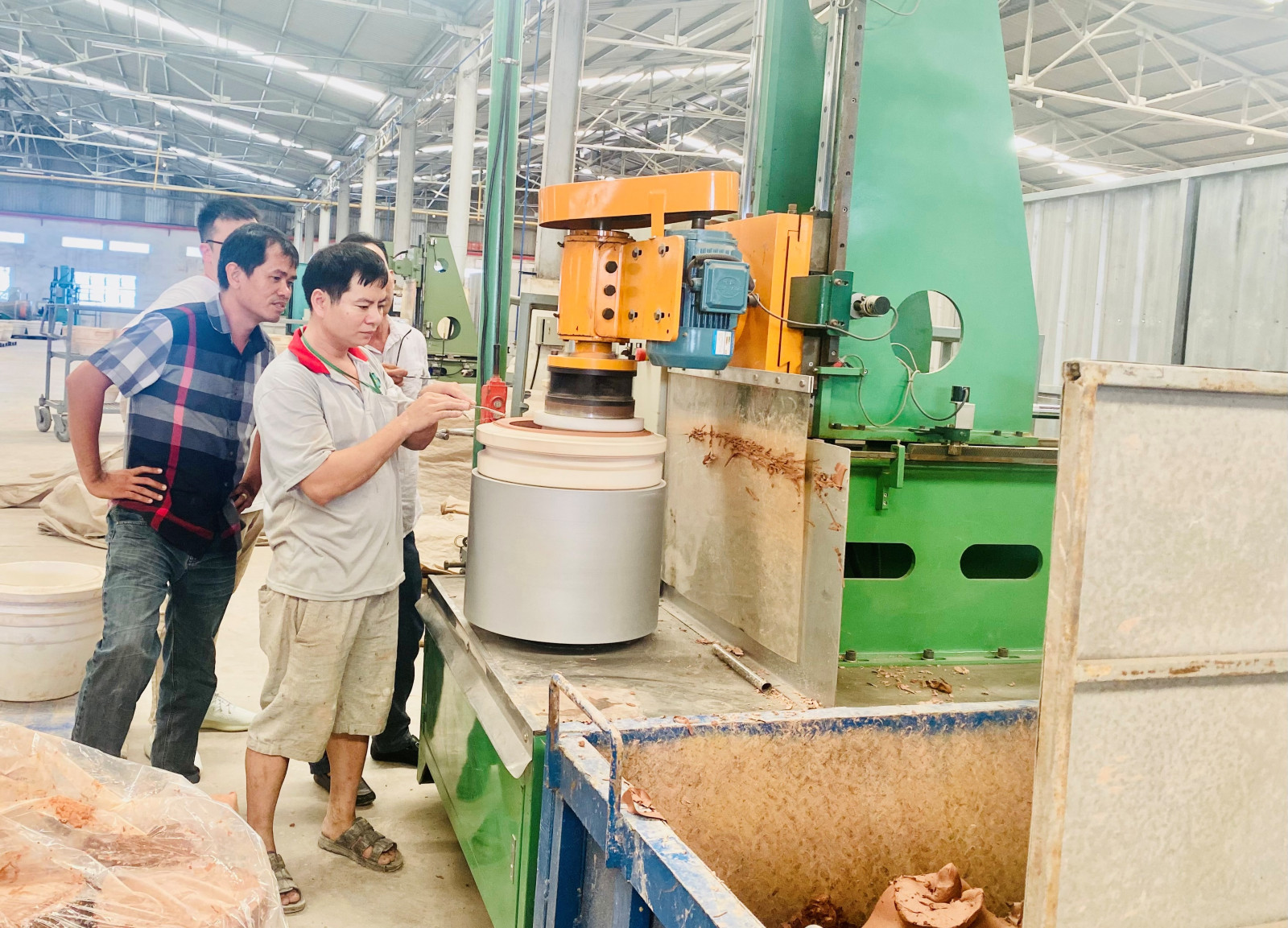Báo Bình Dương điện tử - www.baobinhduong.vn
Tổng Biên tập: LÊ MINH TÙNG
Phó Tổng Biên tập: HUỲNH MINH DÂN - NGUYỄN QUỐC LIÊM
Part 2: Collaboration for mutual development
In addition to favorable conditions, businesses are still facing numerous challenges in export activities. Along with the State’s support policies, collaborative efforts towards mutual development are an essential path for businesses in the current context.
Need for contingency plans
Leader of provincial Department of Industry and Trade noted that the province’s industrial production over the first nine months of 2024 has seen significant improvement, with key export sectors gradually recovering. However, some industries and sectors have continued facing difficulties, mainly due to the high costs of raw materials and transportation.

Ceramics production at Phuoc Du Long Co., Ltd.
Truong Thi Thuy Lien, Vice Chairwoman of Binh Duong provincial Leather and Footwear Association mentioned that while companies in the industry still have orders, most of them are small in quantity, with customers demanding high technical skills and craftsmanship. From now until the end of the year, businesses will continue facing competition pressure regarding low prices and rising costs... In this context, additional mechanisms and policies are needed to develop auxiliary industries, provide financial support and lower interest rates, helping companies enhance their competitiveness in the global market.
Vuong Sieu Tin, Vice Chairman of Binh Duong provincial Ceramics Association and Director of Phuoc Du Long Co., Ltd. in Tan Uyen city shared that in the current context of global instability, especially with increasing market competition, ceramic businesses are required to constantly innovate their thinking, develop appropriate strategies and accelerate technological transformation, digitalization and renewal of their business models. Amid general difficulties, businesses need contingency plans to ensure the continuity of exports.
"Phuoc Du Long is currently well-known as Vietnam's leading brand in garden ceramics, exporting to many countries such as Germany, France, the Netherlands, the U.S., Japan... However, we still face challenges as our 2024 order volume is only about 60% of the amount in 2023. Additionally, foreign markets demand strict product quality standards. Therefore, for our handicraft ceramics to penetrate tough markets, we must meet higher safety standards and constantly update product designs. To maintain production, we are actively connecting with global markets and customers to enhance our brand and expand our markets", said Mr. Tin.
Regarding the wood sector, Nguyen Minh Nhat, Director of Nhat Nam Mechanical Construction Plywood Co., Ltd. in Ben Cat city stated that while the wood industry has seen strong growth this year, orders for companies remain unstable. Some companies have orders double those of the previous year while others are operating at only 50%. The uneven recovery of consumer markets across product segments is the main cause, with higher product quality demands and lower order quantities.
Diverse solutions
According to Mr. Nhat, in the face of the current difficulties, businesses must adapt, collaborate on production, share markets, orders and experience. “Amid many fluctuations, wood companies are actively collaborating to expand markets, diversify supply chains and minimize risks from over-reliance on a single market or supplier”, said Mr. Nhat.
According to Binh Duong provincial Furniture Association (BIFA), B2B (business-to-business) markets play a vital role for wood companies. However, to keep up with the rapid development of digital technology, many businesses are gradually expanding into B2C (business-to-consumer) markets to diversify distribution channels and reduce dependence on B2B. To support businesses, BIFA has recently held a meeting with representatives from Wayfair, the top U.S. e-commerce platform specializing in furniture. Wayfair aims at providing province-based wood companies access to global markets, opening up new business trends and supporting them in digital transformation.
“To support businesses, Binh Duong provincial Leather and Footwear Association has proposed the State Bank and credit funds to guide and create favorable conditions for businesses to access preferential loans with low-interest rates so that they can maintain production, invest in machinery and upgrade technology. The State Bank should direct commercial banks to offer policies that allow businesses to restructure and extend their debts, giving them more time to repay their loans”, proposed Mrs. Lien.
Addressing the challenge of raw material shortage, Nguyen Thanh Toan, Director of provincial Department of Industry and Trade expressed support for establishing a large-scale raw materials trading center in Binh Duong. This center will help resolve supply bottlenecks in the textile, garment and footwear sectors, promote investment in material production in the region and across the country, serving both domestic and export markets. "Under provincial planning for the 2021-2030 period with a vision to 2050 and the project to relocate businesses from the south to the north of the province, we will give priority to establishing raw material centers in alignment with regional development goals in Di An and Thuan An cities”, informed Mr. Toan.
Reported by Tieu My-Translated by Kim Tin